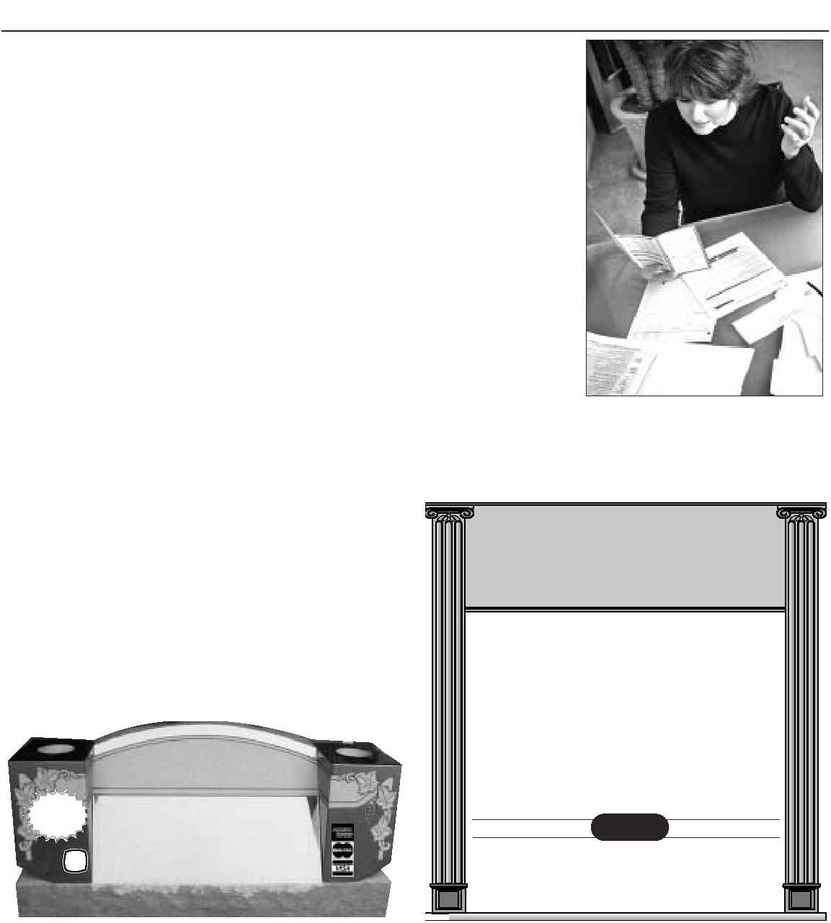
o you want to improve your financial
future, lower your financial stress and
counter your tendency to overspend? Or
maybe you want to stop the collection agents
and credit card companies from banging on
your door.
It's time to give yourself a spending audit,
says Jim Trippon, CPA, author of "How Mil-
lionaires Stay Rich Forever" (Bretton Woods
Press) and financial adviser to hundreds of
millionaires, many of whom went from rags
to riches by budgeting their money wisely.
Budgeting helps you reach a financial goal,
whether that be breaking even or becoming
a millionaire. In fact, Trippon believes any-
one can become a millionaire by living frugally
and by having a good savings plan.
So grab a pen and paper and set up an
Excel spreadsheet or nab one of the many
budget templates available online. You're on
the way to developing a budget to keep your
spending on track and put more money in
your wallet!
· Determine your monthly expenses. The
first step to budgeting is tracking where your
money comes from and where it's going. Keep
track of all your expenses and income for the
next month or two.
You can do this by recording purchases
and collecting receipts to determine your
monthly costs on items such as food, enter-
tainment, car and housing. Or an even eas-
ier way to track this, Trippon says, is by ask-
ing your credit card company to give you an
annual statement of your expenses for the
last year. Also use your check register to help
determine your average expenses too, which
can also help you track all those ATM cash
withdrawals.
· Create categories for your budget. Break
down your budget into categories such as
housing, food (e.g. grocery store and eating out),
personal care (e.g. haircuts, cosmetics and
clothing), transportation (e.g. car payments,
insurance, fuel and maintenance), enter-
tainment, savings and investments, utilities
(e.g. phone, cable, water and sewer, gas and
electricity), other monthly payments (e.g.
credit card bills and health insurance), char-
itable contributions, and miscellaneous expens-
es such as vacations, unplanned car repairs, or
home plumbing that needs immediate replace-
ment.
· Allocate a percentage to each catego-
ry. Categories vary greatly, depending on your
spending habits, financial experts say. Also,
your geographic location may shape your
budget -- for example, those who live in
New York City may devote half of their income
to rent since housing costs tend to be high-
er there, whereas in other cities, housing may
only make up 30 percent of your budget. As
a general rule, Trippon advises saving 10 per-
cent of your monthly income and then break-
ing the remainder into percentages to cover
the other categories' average expenses. Your
overall goal should be to save 10 percent
monthly as well as not incur any additional
debt, he says.
· Stick to your budget. Hold yourself
accountable to your budget by maintaining
accurate records. Every week, record your
receipts under each budgeted category to keep
yourself in check. At the end of the month,
compare your actual expenses to your bud-
geted amounts. Are you over budget, under
budget or right on track? A re-evaluation of
your spending habits may be in order if you find
you're over budget.
In fact, "You might need to do plastic sur-
gery by cutting up those credit cards," Trip-
pon says. For example, you might switch to a
debit card, where you have to use the money
in your checking account, or you might refrain
from splurging to determine if you really need
that particular item by waiting at least 72
hours before buying it. Also, if you
owe a lot of money on your credit
cards, Trippon recommends asking
your credit card companies for a
lower interest rate -- about half of
the time, they'll grant it, he says.
Or, you might consider switching
to another credit card that offers a
lower interest rate.
· Show me the money. Don't
forget to budget some money toward
savings and investments to improve
your financial future. If you find
yourself falling under budget, pay
the surplus toward any debts, espe-
cially ones with high interest rates,
or use it to save for splurges, like
home remodeling or a new car. Also
take advantage of the maximum
matching contribution your com-
pany offers on your 401k plan by
contributing at least that much,
which can boost your overall compensation
by five to 10 percent.
And if your financial goal is to become a
millionaire, you can achieve that feat by sav-
ing $3.87 a day from age 20 until 65 in a Roth
IRA account or taking advantage of other
savings plans with IRA accounts, Trippon
says. By the time you retire, your tax-free
investments will make you a millionaire!
How to create a budget
K
C
M
Y
The Citizen, Auburn, New York
Secure Your Future
January 29, 2006
5
Contiguglia Law Offices LLP
G
ENERAL
P
RACTICE OF LAW
· Wills, Trusts, Probate & Estates
· Estate Planning
· Real Estate Law
· Vehicle & Traffic Law
· Corporation, Partnership & Business Law
· General Practice
David A. Contiguglia
252-7515
Louis P. Contiguglia
100 Genesee St.
www.lawyers.com/contiguglia
Mon.-Fri. 8:15-3:15
Evenings & weekends by appt.
131 Seymour St. · Auburn, NY
BARRE
GUILD
View our unique stone
concepts alongside the
traditional memorials
Veteran Owned.
M
ID
-L
AKES
M
EMORIALS
(Justy Monuments ~ Gilboy Simpson Monuments)
Indoor
Heated
Showroom
Call 253-7971 or 730-9221 Anytime
Call 253-7971 or 730-9221 Anytime
Locally owned & operated
by Jim Moulton
Locally owned & operated
by Jim Moulton
D
